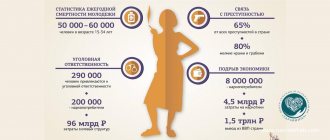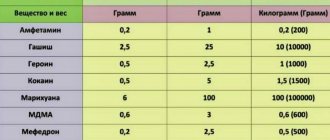The problem of mass distribution and use of drugs worries the governments and populations of many countries around the world. The UN Office on Drugs in its report reported in 2016 that the total number of people using drugs today is 4-5% of the population aged 16 to 64 years. Illicit trafficking in narcotic and psychotropic drugs is expanding every year in Russia, posing a threat to the security of society and the individual. Drug addiction claims thousands of lives every year, most often of young people. Drug addicts are not stopped by the threat of punishment, because there is no criminal liability for drug use.
One of the reasons for the increase in drug use is drug propaganda and advertising of prohibited substances.
Legal prosecution for promoting drugs and psychotropic drugs
Propaganda of drugs and psychotropic substances refers to the actions of individuals and legal entities aimed at:
- bringing to people information about the methods and methods of production, preparation and use, places of purchase of prohibited substances;
- production and distribution of printed materials, as well as the use of the media and the Internet to post such information.
The ultimate goal of the above actions is to persuade a person to use prohibited substances.
Russian legislation provides for two types of prosecution for drug promotion activities:
- administrative;
- criminal.
In the first case, this is Article 6.13 of the Code of Administrative Offenses of the Russian Federation. The second contains Article 230 of the Criminal Code of the Russian Federation, which we will consider in more detail.
According to this provision of the Criminal Code, liability arises for inducing a person to use narcotic, psychotropic substances or their analogues. The sanction depends on the subject of the crime, the object of the attack, the circumstances surrounding the act and the resulting consequences.
For example, if under the first part of the article the maximum punishment provides for imprisonment of up to five years (a crime of moderate gravity), then under the third part (when the victim has not reached the age of majority or has died, or has become a drug addict, is seriously ill or has committed suicide) you can say goodbye to freedom for up to fifteen years (and this is a particularly serious crime).
Important! Article 230 of the Criminal Code has a note according to which criminal liability does not arise for promoting the use of tools and equipment for the use of drugs and psychotropic substances for the purpose of preventing dangerous diseases, if these activities have been appropriately coordinated with authorities and law enforcement officers.
Article 6.13 of the Code of the Russian Federation on Administrative Offenses provides for administrative liability for propaganda and illegal advertising of narcotic drugs and psychotropic substances.
The main purpose of establishing administrative responsibility for drug propaganda is to organize counteraction to illicit trafficking in narcotic drugs, psychotropic substances and their precursors, as well as to protect public health, public morality and order.
Responsibility for committing this offense occurs in the event of dissemination of information about narcotic drugs, psychotropic substances or their precursors, regardless of the form in which they are presented. To establish the composition of an administrative offense, it is necessary to reliably determine that it is narcotic drugs, psychotropic substances or their precursors included in the list of narcotic drugs, psychotropic substances and their precursors subject to control in the Russian Federation that are being promoted.
Responsibility under Art. 6.13 of the Code of Administrative Offenses of the Russian Federation constitutes the following illegal actions:
- Propaganda of narcotic drugs, psychotropic substances and their precursors.
According to Article 46 of the Federal Law “On Narcotic Drugs and Psychotropic Substances,” propaganda of narcotic drugs, psychotropic substances and their procurers is the activity of individuals or legal entities aimed at disseminating information about the methods, methods of development, production and use, places of purchase of narcotic drugs, psychotropic substances substances and their procurers, as well as the production and distribution of books, media products, the distribution of the specified information on computer networks or the commission of other actions for these purposes are prohibited. The same article prohibits the promotion of any advantages of using certain narcotic drugs, psychotropic substances, their analogues and precursors, as well as the promotion of the use for medical purposes of narcotic drugs, psychotropic substances that suppress a person’s will or negatively affect his mental or physical health.
Article 2 of the Law of the Russian Federation “On the Mass Media” discloses the content of such a method of drug propaganda as the distribution of products using the media.
- Illegal advertising of narcotic drugs, psychotropic substances or their precursors.
In accordance with the Federal Law “On Advertising,” advertising of narcotic drugs is information disseminated in any way, in any form and using any means, addressed to an indefinite number of people and aimed at drawing attention to narcotic drugs, psychotropic substances and their precursors, creating or maintaining interest in them and their maintenance on the market.
All types of persons are subject to liability for committing the offense in question: individuals (citizens; officials; persons engaged in business activities without forming a legal entity, who have reached the age of 16 years) and legal entities (organizations). At the same time, the legislator differentiates the amount of liability for different types of persons.
Thus, according to the sanction of Article 6.13 of the Code of Administrative Offenses of the Russian Federation, the commission of the above acts entails the imposition of an administrative fine on citizens in the amount of four thousand to five thousand rubles with confiscation of advertising products and equipment used for their production; for officials - from forty thousand to fifty thousand rubles; for persons carrying out entrepreneurial activities without forming a legal entity - from forty thousand to fifty thousand rubles with confiscation of advertising products and equipment used for their production or administrative suspension of activities for up to ninety days with confiscation of advertising products and equipment used for their production ; for legal entities - from eight hundred thousand to one million rubles with confiscation of advertising products and equipment used for their production or administrative suspension of activities for up to ninety days with confiscation of advertising products and equipment used for their production.
In case of propaganda of narcotic drugs by a foreign citizen or a stateless person, punishment is provided in the form of an administrative fine in the amount of four thousand to five thousand rubles with administrative deportation from the Russian Federation or administrative arrest for a term of up to fifteen days with administrative deportation from the Russian Federation. .
It should be borne in mind that it is not an administrative offense to distribute in specialized publications intended for medical and pharmaceutical workers information about narcotic drugs, psychotropic substances and their precursors approved for use for medical purposes.
It is necessary to take into account that the norms of Article 6.13 of the Code of Administrative Offenses of the Russian Federation and the corresponding sanctions will apply to persons guilty of propaganda or illegal advertising of plants containing narcotic substances or psychotropic substances or their precursors, and their parts containing these drugs or substances and their precursors.
In practice, individual entrepreneurs are most often brought to administrative responsibility for promoting narcotic drugs and psychotropic substances. For example, courts consider the promotion of T-shirts with images of the apical parts of hemp plants and hemp leaves as propaganda of narcotic drugs.
Administrative responsibility
Administrative legislation provides for a separate article for drug propaganda.
The main purpose of establishing this type of liability is to combat illicit trafficking in prohibited substances and protect the health and lives of people. Sanctions are applied when disseminating information about narcotic and psychotropic drugs or their precursors, regardless of the form in which the information is submitted.
Attention! In order to create an offense, it is necessary that the substances contained in the corresponding list of substances prohibited for free circulation be promoted or advertised.
Goals, objectives and ideas of the law
The main goals and objectives that served as the impetus for improving anti-drug legislation are partially covered in the explanatory note appendix to the project submitted by the Government to the State Duma.
The additional document states that the authorities regularly analyze information about administrative violations in the field of drug trafficking. The number of detected offenses is constantly increasing, and the accessibility and uncontrollability of information flows on the Internet often plays a decisive role in this. It is easy for individuals who commit offenses online to remain anonymous.
Important. The popularization of narcotic drugs on the World Wide Web reaches a multimillion-dollar audience, a large percentage of which is formed by minor users. The most dangerous for citizens are most often various thematic forums, blogs, and Internet platforms that sell prohibited products, building up an online customer base.
Legal commentary on Article 6.13 of the Code of Administrative Offenses of the Russian Federation
Like any administrative offense, this article has:
- subject (offender subject to responsibility for his actions);
- object (health, life, public order and morality);
- the subjective side (direct intent, since actions to promote and advertise prohibited substances are carried out deliberately);
- objective side (actions of the offender aimed at promoting and advertising prohibited substances and plants).
All of the above points together form the composition of Article 6.13 of the Code of Administrative Offenses of the Russian Federation.
Responsibility arises when promoting or knowingly illegal advertising of drugs, psychotropic substances, their precursors, as well as narcotic plants and precursors, potentially dangerous new psychoactive substances . The offender’s goal is to attract people’s attention and make them want to purchase prohibited drugs.
Important! Administrative punishment under this article is not applied when disseminating information about drugs, psychotropic substances and their precursors in special publications for medical and pharmaceutical workers, if such drugs can be prescribed for medical purposes.
What happens if the law is passed?
The transformation of current administrative practice into criminal practice will worsen the situation. Even if applied rarely and selectively, the law would effectively prohibit any independent discussion and research on psychoactive substances and their social and cultural role. It will also make any discussion about drug policy virtually impossible.
The only way to speak about psychoactive substances that will not potentially land you in prison will be hate speech of varying degrees of vigor. This will not even require mass repression: as soon as the new law begins to be applied, the machine of censorship and self-censorship will work to its fullest. People will be afraid not only to have a rational public discussion about psychoactive substances, but also to consistently think through any ideas on this topic (after all, no thought is possible without communication, including public communication).
Thus, this entire sphere of knowledge will be given over to the power of myth - be it the state “black legend”, the dominance of which is sought by supporters of this initiative, or drug-positive myths of underground subcultures, which, in conditions of total censorship and propaganda of hatred, will seem much more reliable to any critical thinker to people.
Still from the movie "Trainspotting"
The forbidden fruit is sweet - and it is difficult to imagine what would contribute more to doubts in the official position than the forcible cessation of discussion on a particular topic.








